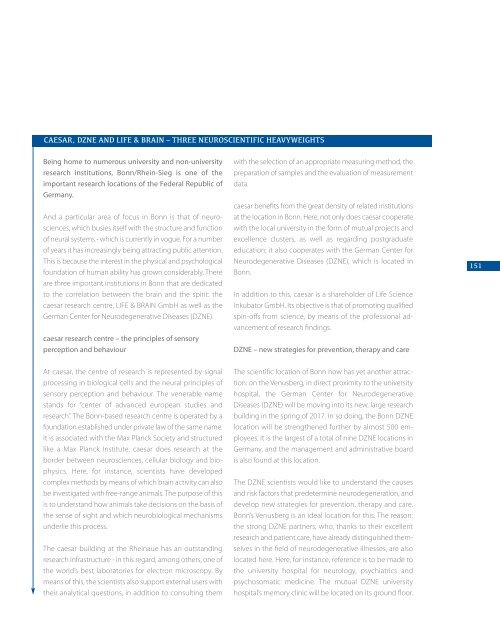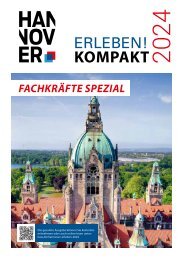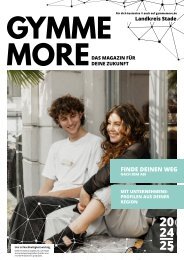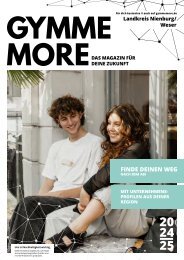Monographie Bonn-Rhein-Sieg
You also want an ePaper? Increase the reach of your titles
YUMPU automatically turns print PDFs into web optimized ePapers that Google loves.
CAESAR, DZNE AND LIFE & BRAIN – THREE NEUROSCIENTIFIC HEAVYWEIGHTS<br />
Being home to numerous university and non-university<br />
research institutions, <strong>Bonn</strong>/Rhein-<strong>Sieg</strong> is one of the<br />
important research locations of the Federal Republic of<br />
Germany.<br />
And a particular area of focus in <strong>Bonn</strong> is that of neurosciences,<br />
which busies itself with the structure and function<br />
of neural systems - which is currently in vogue. For a number<br />
of years it has increasingly being attracting public attention.<br />
This is because the interest in the physical and psychological<br />
foundation of human ability has grown considerably. There<br />
are three important institutions in <strong>Bonn</strong> that are dedicated<br />
to the correlation between the brain and the spirit: the<br />
caesar research centre, LIFE & BRAIN GmbH as well as the<br />
German Center for Neurodegenerative Diseases (DZNE).<br />
caesar research centre – the principles of sensory<br />
perception and behaviour<br />
with the selection of an appropriate measuring method, the<br />
preparation of samples and the evaluation of measurement<br />
data.<br />
caesar benefits from the great density of related institutions<br />
at the location in <strong>Bonn</strong>. Here, not only does caesar cooperate<br />
with the local university in the form of mutual projects and<br />
excellence clusters, as well as regarding postgraduate<br />
education; it also cooperates with the German Center for<br />
Neurodegenerative Diseases (DZNE), which is located in<br />
<strong>Bonn</strong>.<br />
In addition to this, caesar is a shareholder of Life Science<br />
Inkubator GmbH. Its objective is that of promoting qualified<br />
spin-offs from science, by means of the professional advancement<br />
of research findings.<br />
DZNE – new strategies for prevention, therapy and care<br />
151<br />
At caesar, the centre of research is represented by signal<br />
processing in biological cells and the neural principles of<br />
sensory perception and behaviour. The venerable name<br />
stands for “center of advanced european studies and<br />
research”. The <strong>Bonn</strong>-based research centre is operated by a<br />
foundation established under private law of the same name.<br />
It is associated with the Max Planck Society and structured<br />
like a Max Planck Institute. caesar does research at the<br />
border between neurosciences, cellular biology and biophysics.<br />
Here, for instance, scientists have developed<br />
complex methods by means of which brain activity can also<br />
be investigated with free-range animals. The purpose of this<br />
is to understand how animals take decisions on the basis of<br />
the sense of sight and which neurobiological mechanisms<br />
underlie this process.<br />
The caesar building at the Rheinaue has an outstanding<br />
research infrastructure - in this regard, among others, one of<br />
the world’s best laboratories for electron microscopy. By<br />
means of this, the scientists also support external users with<br />
their analytical questions, in addition to consulting them<br />
The scientific location of <strong>Bonn</strong> now has yet another attraction:<br />
on the Venusberg, in direct proximity to the university<br />
hospital, the German Center for Neurodegenerative<br />
Diseases (DZNE) will be moving into its new, large research<br />
building in the spring of 2017. In so doing, the <strong>Bonn</strong> DZNE<br />
location will be strengthened further by almost 500 em -<br />
ployees. It is the largest of a total of nine DZNE locations in<br />
Germany, and the management and administrative board<br />
is also found at this location.<br />
The DZNE scientists would like to understand the causes<br />
and risk factors that predetermine neurodegeneration, and<br />
develop new strategies for prevention, therapy and care.<br />
<strong>Bonn</strong>’s Venusberg is an ideal location for this. The reason:<br />
the strong DZNE partners, who, thanks to their excellent<br />
research and patient care, have already distinguished themselves<br />
in the field of neurodegenerative illnesses, are also<br />
located here. Here, for instance, reference is to be made to<br />
the university hospital for neurology, psychiatrics and<br />
psychosomatic medicine. The mutual DZNE university<br />
hospital’s memory clinic will be located on its ground floor.


















